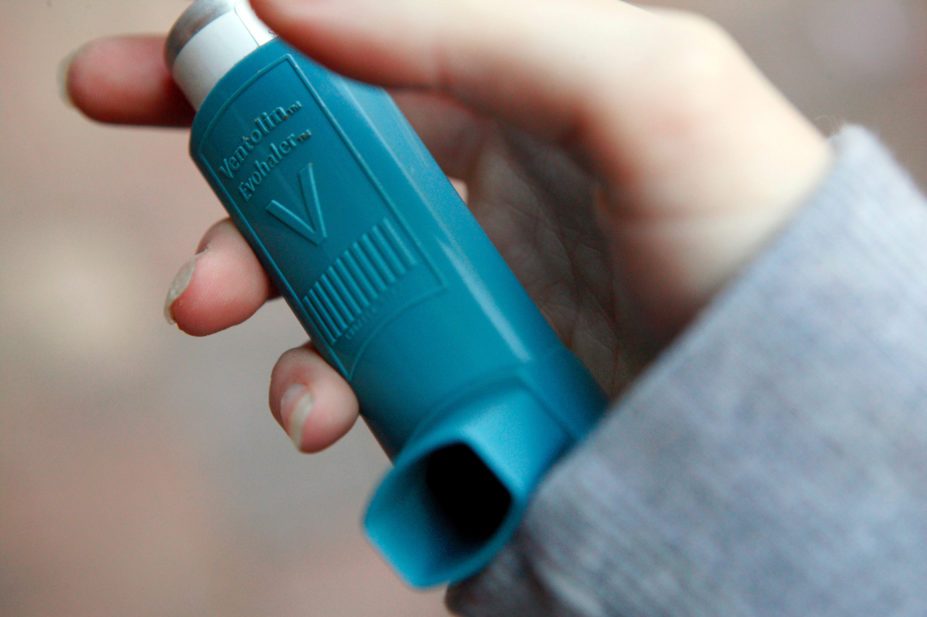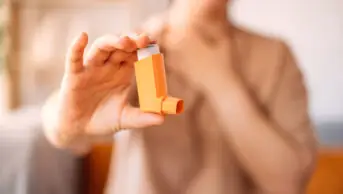
Alamy Stock Photo
More than half of patients with asthma in the UK are ”potentially overusing” short-acting β2-agonists (SABAs), according to research.
The researchers, who will be presenting the findings at the British Thoracic Society Winter Meeting, found that SABA use and the amount of greenhouse gases emitted by the inhalers are approximately three times higher in the UK than in other European countries.
Meanwhile, 284,683 out of 574,913 asthma patients in the SABA Use in Asthma (SABINA) UK programme, were found to be “potentially overusing” the medicine.
The extent of SABA overuse was extracted from Clinical Practice Research Datalink GOLD as part of the SABINA UK programme, which is funded by the pharmaceutical company AstraZeneca.
The study defined SABA overuse as having 3 or more prescriptions in 12 months, with the 284,683 patients from the SABINA UK programme receiving on average 6.51 prescriptions per year.
The researchers calculated that 83% of SABA prescriptions for asthma went to patients that were overusing the medicine, and estimated that this overuse represented 9.24 million SABA prescriptions and the equivalent of 250,000 tonnes of carbon dioxide annually.
Inhaler use was calculated using sales data from the life sciences analytics company IQVIA over 12 months up to September 2019, while the greenhouse gas emissions of inhaler devices were estimated using both published and internal data gathered by AstraZeneca.
Current guidance from the British Thoracic Society and the Scottish Intercollegiate Guidelines Network advises that adults and children with asthma should be prescribed a SABA to relieve their symptoms. For those who have infrequent and short-lived wheeze, they may need their SABA inhaler occasionally but this may be the only treatment they require.
The guidance says that an inhaled corticosteroid (ICS) preventer inhaler should be considered only for those who use SABA three times per week or more; have had an asthma attack in the past two years; are symptomatic three times per week or more; or are waking up one night per week because of their asthma symptoms.
In contrast, the Global Initiative for Asthma (GINA) no longer recommends SABA alone in the treatment of asthma in adults and adolescents. Instead, it recommends that all patients should be provided with inhaler corticosteroid-formoterol from the start of therapy, with SABA sometimes used as needed.
Anna Murphy, a consultant respiratory pharmacist at University Hospitals of Leicester NHS Trust, described the study as “important”.
“The [researchers] classed overuse as more than three canisters of SABA in a year; we know that people with good asthma control should be [using]one to two canisters per year,” she said.
Murphy said that some of the reasons for misuse included sub-optimal inhaler technique, leading to reduced lung deposition, and a subsequent increase in the number of doses to achieve the desired effect.
“Most SABA inhalers in the UK (97%, I believe) are MDIs [metered dose inhalers], often used without a spacer, [and] many patients are on mixed DPI [dry powder inhaler] preventers and SABA MDIs, which has been shown to increase SABA use.”
She added that, clinically, SABAs can lead to anxiety, as well as tachycardia, cramps, tremor — which may perpetuate SABA use — and in some cases, patients may actually have uncontrolled disease and need treatment stepped up or reviewed.
“It is important that shared decision making supports any intervention,” she said.
Alexander Wilkinson, a consultant in respiratory and general medicine at East and North Hertfordshire NHS Trust, and lead author of the study, said: “Overuse of reliever inhalers in asthma is widespread in the UK and associated with an increased risk of exacerbations for patients, highlighting the importance of adopting strategies to improve disease control and reduce short-acting β2-agonist overuse.”
“This new analysis shows that reliever overuse is also a major contributor to greenhouse gas emissions in respiratory care, similar to driving an average diesel car for about 900 million miles.
“These findings are important for informing clinical guidelines and healthcare policies to support improvements in asthma care, while also realising carbon savings.”


